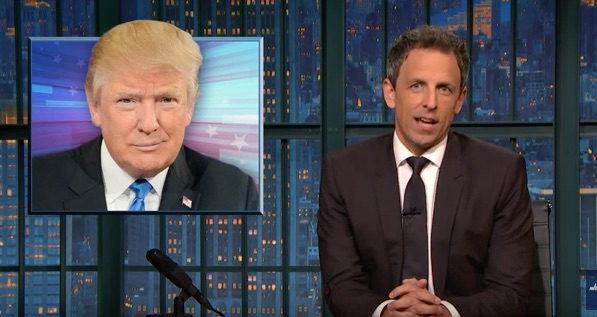Seth Meyers takes a closer look at Trump's courting of black and Latino voters


A free daily email with the biggest news stories of the day – and the best features from TheWeek.com
You are now subscribed
Your newsletter sign-up was successful
In order to successfully reach out to black and Latino voters, Seth Meyers believes Donald Trump needs to do more than just give himself a nickname and dance like a dorky dad.
On Tuesday's Late Night, Meyers examined Trump's trip to a church in Detroit, where his surrogate Ben Carson was seen paying more attention to his phone than the service and Trump himself was spotted "awkwardly swaying back and forth like a dad who brought his kids to a Demi Lovato concert." He also poked fun at a tweet Trump sent out, addressed to the "African-American community," which said the "Democrats have failed you for fifty years, high crime, poor schools, no jobs. I will fix it, VOTE 'T.'" An incredulous Meyers asked, "'T'? Is he trying to give himself a nickname to appeal to black voters? Come November 8, vote D. Trizzy, or maybe A$AP Donald, or my personal favorite, Donye Worst."
When it comes to Latinos, Meyers continued, Trump is trying to have it both ways, making it sound like he is softening his stance on immigration while continuing his rhetoric that "isn't about addressing the problem, it's about appealing to people's fear of cultural change." Meyers then showed a clip of the founder of Latinos for Trump announcing on MSNBC that if Trump's immigration policy doesn't become implemented, there will be a taco truck on every corner. "Taco trucks on every corner?" Meyers asked. "You can't threaten people with something they actually want. This is America, the only thing we love more than tacos are tacos that come to us." Watch the video below. Catherine Garcia
The Week
Escape your echo chamber. Get the facts behind the news, plus analysis from multiple perspectives.

Sign up for The Week's Free Newsletters
From our morning news briefing to a weekly Good News Newsletter, get the best of The Week delivered directly to your inbox.
From our morning news briefing to a weekly Good News Newsletter, get the best of The Week delivered directly to your inbox.
A free daily email with the biggest news stories of the day – and the best features from TheWeek.com
Catherine Garcia has worked as a senior writer at The Week since 2014. Her writing and reporting have appeared in Entertainment Weekly, The New York Times, Wirecutter, NBC News and "The Book of Jezebel," among others. She's a graduate of the University of Redlands and the Columbia University Graduate School of Journalism.
-
 6 of the world’s most accessible destinations
6 of the world’s most accessible destinationsThe Week Recommends Experience all of Berlin, Singapore and Sydney
-
 How the FCC’s ‘equal time’ rule works
How the FCC’s ‘equal time’ rule worksIn the Spotlight The law is at the heart of the Colbert-CBS conflict
-
 What is the endgame in the DHS shutdown?
What is the endgame in the DHS shutdown?Today’s Big Question Democrats want to rein in ICE’s immigration crackdown
-
 Witkoff and Kushner tackle Ukraine, Iran in Geneva
Witkoff and Kushner tackle Ukraine, Iran in GenevaSpeed Read Steve Witkoff and Jared Kushner held negotiations aimed at securing a nuclear deal with Iran and an end to Russia’s war in Ukraine
-
 Pentagon spokesperson forced out as DHS’s resigns
Pentagon spokesperson forced out as DHS’s resignsSpeed Read Senior military adviser Col. David Butler was fired by Pete Hegseth and Homeland Security spokesperson Tricia McLaughlin is resigning
-
 Judge orders Washington slavery exhibit restored
Judge orders Washington slavery exhibit restoredSpeed Read The Trump administration took down displays about slavery at the President’s House Site in Philadelphia
-
 Hyatt chair joins growing list of Epstein files losers
Hyatt chair joins growing list of Epstein files losersSpeed Read Thomas Pritzker stepped down as executive chair of the Hyatt Hotels Corporation over his ties with Jeffrey Epstein and Ghislaine Maxwell
-
 Judge blocks Hegseth from punishing Kelly over video
Judge blocks Hegseth from punishing Kelly over videoSpeed Read Defense Secretary Pete Hegseth pushed for the senator to be demoted over a video in which he reminds military officials they should refuse illegal orders
-
 Trump’s EPA kills legal basis for federal climate policy
Trump’s EPA kills legal basis for federal climate policySpeed Read The government’s authority to regulate several planet-warming pollutants has been repealed
-
 House votes to end Trump’s Canada tariffs
House votes to end Trump’s Canada tariffsSpeed Read Six Republicans joined with Democrats to repeal the president’s tariffs
-
 Bondi, Democrats clash over Epstein in hearing
Bondi, Democrats clash over Epstein in hearingSpeed Read Attorney General Pam Bondi ignored survivors of convicted sex offender Jeffrey Epstein and demanded that Democrats apologize to Trump
